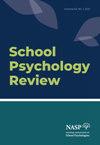学校心理学研究中的白人特权概念化与解构:一个生态模型
IF 3
3区 心理学
Q1 Social Sciences
引用次数: 6
摘要
大量文献探讨了个体种族主义和结构性种族主义对学校心理学家工作的影响;然而,很少有研究专门关注白人特权。此外,目前许多关于白人特权的学校心理学研究都集中在培训和实践问题上,而探索其与研究活动交集的文献相对较少。在这篇文章中,我们描述了白人研究的出现及其与学校心理学的相关性。我们在研究过程的四个阶段概述了一个概念化白人特权的生态模型:(a)研究投入,(b)转化,(c)研究产出,(d)研究在实践中的应用。我们还描述了在每个阶段塑造学校心理学家研究活动的宏观层面和微观层面的影响。最后,我们概述了在研究过程的各个阶段废除白人特权的建议。白人特权在塑造学校心理学家的研究活动方面发挥了重要作用,包括他们的研究问题、资源获取、方法论偏好、出版物和实践应用。在学校心理学中推进公平和社会正义将涉及在研究过程的各个阶段质疑和拆除白人特权。本文章由计算机程序翻译,如有差异,请以英文原文为准。
Conceptualizing and Dismantling White Privilege in School Psychology Research: An Ecological Model
Abstract A considerable body of literature has explored the impact of individual and structural racism on the work of school psychologists; however, less research has focused on White privilege specifically. Moreover, much of school psychology’s current scholarship on White privilege has focused on issues in training and practice, with relatively less literature exploring its intersection with research activities. In this article, we describe the emergence of Whiteness studies and their relevance for school psychology. We outline an ecological model for conceptualizing White privilege across four stages of the research process: (a) research inputs, (b) transformations, (c) research outputs, and (d) applications of research to practice. We also describe macrolevel and microlevel influences that shape school psychologists’ research activities at each of these stages. Finally, we outline recommendations for dismantling White privilege across all stages of the research process. Impact Statement White privilege has a substantial role in shaping the research activities of school psychologists, including their research questions, access to resources, methodological preferences, publications, and applications to practice. Advancing equity and social justice in school psychology will involve interrogating and dismantling White privilege at all stages of the research process.
求助全文
通过发布文献求助,成功后即可免费获取论文全文。
去求助
来源期刊

School Psychology Review
Social Sciences-Education
CiteScore
6.90
自引率
20.00%
发文量
54
期刊介绍:
School Psychology Review (SPR) is a refereed journal published quarterly by NASP. Its primary purpose is to provide a means for communicating scholarly advances in research, training, and practice related to psychology and education, and specifically to school psychology. Of particular interest are articles presenting original, data-based research that can contribute to the development of innovative intervention and prevention strategies and the evaluation of these approaches. SPR presents important conceptual developments and empirical findings from a wide range of disciplines (e.g., educational, child clinical, pediatric, community.
 求助内容:
求助内容: 应助结果提醒方式:
应助结果提醒方式:


